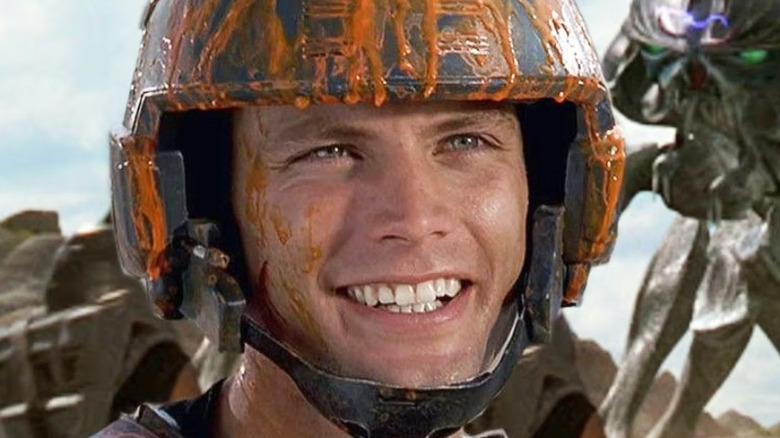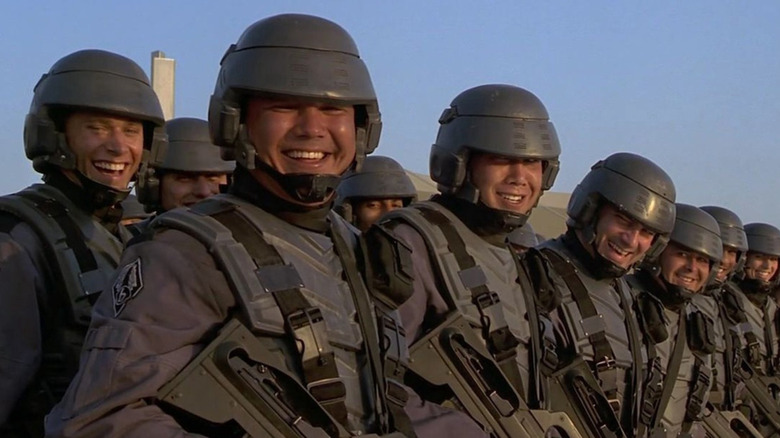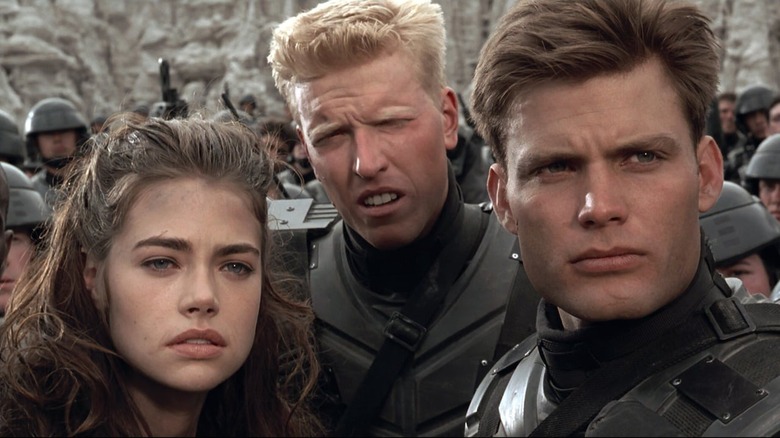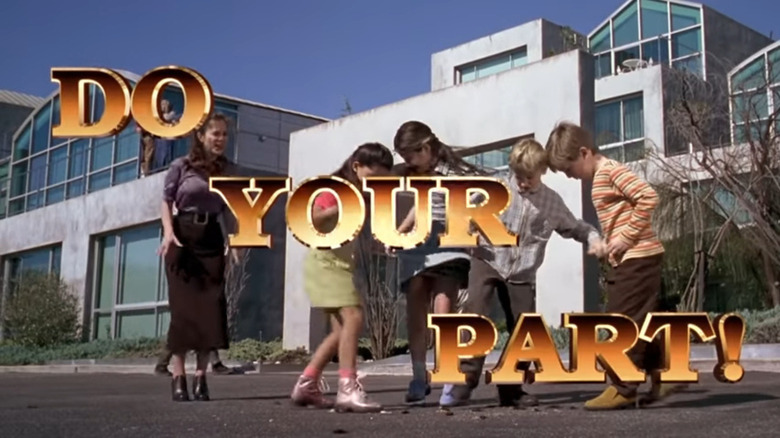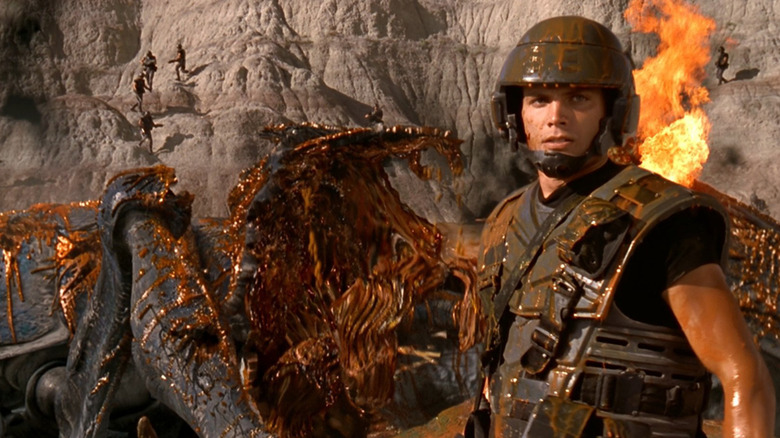25 Years Ago, Starship Troopers Solidified Paul Verhoeven's Status As A Cinematic Satirist
"Starship Troopers" is a movie that we at /Film are no strangers to, especially as a piece of poignant sociopolitical commentary. Our very own Jacob Hall wrote in his dedicated Daily Stream that it is "less of an adaptation and more of an evisceration, a shiny, big-budget middle finger to fascism disguised as a vapid blockbuster." When it was released back in 1997, many didn't pick up on the dark humor, confusing the satire for either full-blown apologia or just a really weird attempt at a monster movie. Perhaps the most famous example of this confusion came from The Washington Post's review of the film, which called its tone "so inconsistent that it's impossible to decide whether he's sending up the Third Reich or in love with it."
This statement seems ridiculous now, twenty-five years since the film's release. However, at the time, Paul Verhoeven was not a director people associated with outlandish irony. Although his previous films "RoboCop" and "Total Recall" flirted with deeper messaging, it was arguably "Starship Troopers" that helped define the director as a satirist.
Clearing up a misconception
Before elaborating further, we should clarify something. You likely have already heard the Hollywood legend that Verhoeven, when reading the original 1959 Robert A. Heinlein novel, despised its overtly fascist undertones and decided to rework the script. However, that's not necessarily the case. According to "The Making of Starship Troopers" by Paul M. Sammon, the fascistic satire was always a part of the film thanks to "RoboCop" writer Edward Neumeier.
"What I really liked about the idea of this movie was that it allowed me to write about fascism," he said in the book. "You want a world that works? Okay, we'll show you one. And it really does work. It happens to be a military dictatorship, but it works. That was the original rhythm I was trying to play with, just to sort of mess with the audiences."
That doesn't mean the original point about Verhoeven hating the book wasn't true, as well. In fact, the director told Empire Magazine that he couldn't get through it and had to ask Neumeier to summarize it for him. The explanation he got solidified it as an unironic advocate for fascism, and thus the perfect canvas for exaggerated satire.
"All the way through, we were fighting with the fascism, the ultra-militarism," Verhoeven said. "All the way through, I wanted the audience to be asking, 'Are these people crazy?'"
Welcome to the Roughnecks
It turns out that, yes, the United Citizen Federation was crazy, and unabashedly so. From their overly peppy recruitment advertisements to their uncomfortably familiar-looking insignia, Verhoeven made no effort to hide the themes he drew from Heinlein's novel. Instead, he amplified them and made them unmistakable, so much so that he told The Guardian that Columbia Pictures expressed hesitancy upon seeing the final cut.
"When the executives finally saw it, they said: 'Their flag — it's a Nazi flag!'" recalled Verhoeven. "I said, 'No ... it's completely different colours.'"
It wasn't just the flags or uniforms that the director made sure to model after Nazis and the Third Reich. The movie is saturated with pale skin and blue eyes thanks to the likes of Casper Van Dien and Denise Richards, a move that, similar to the aforementioned recruitment ads, was directly inspired by one of the most infamous propaganda films ever created.
"I borrowed from 'Triumph of the Will' in the parody propaganda reel that opens the film, too," Verhoeven told The Guardian. "I was using [Leni] Riefenstahl to point out, or so I thought, that these heroes and heroines were straight out of Nazi propaganda. No one saw it at the time."
The only good bug is a dead bug
The hyper-stylization of the fascist society in "Starship Troopers" presents a future as not one the movie wants to strive towards, but rather, wants to avoid altogether. If audiences get to see the cost of fascism's utopia — the facade of happiness — perhaps they will be able to see through the ideology's lies. In an article for "Shofar: An Interdisciplinary Journal of Jewish Studies," Brian E. Crim writes that "Verhoeven and Neumeier depict a politically correct version of the Nazi national community that is attractive to audiences, but it becomes clear that this gleaming future is just as capable of genocide under the guise of 'total war' as its Nazi antecedent."
That clarity is precisely the core strength of "Starship Troopers," and why it is able to be reevaluated as a misunderstood masterpiece. Everything about the movie, from its violence to its soapy teen drama, is excessive, and it recognizes itself as much. It makes no attempt to downplay how eerie it is. In fact, whenever you think it might tone itself down, it becomes even more overtly excessive; perhaps the most prominent example of this is an advertisement where schoolchildren gleefully stomp on bugs while an adult is overcome with hysterical joy. Depiction does not always equal endorsement, and "Starship Troopers" makes it difficult to assume that it enjoys the "kill first, ask questions later" mentality that hangs over its world.
I'm doing my part
If there is one thing that Verhoeven's work can be described as, it's excessive. The ultraviolence of "RoboCop," the eroticism of "Showgirls," and the blasphemy of "Benedetta," among others, more than prove this. However, this excess arguably does not get any more obvious than "Starship Troopers," and it was for a good reason. If "RoboCop" and "Total Recall" were test runs to see how much social commentary Verhoeven can put in his movies, then "Starship Troopers" was the natural end of this experiment.
The soldiers in the United Citizen Federation are constantly giddy about the idea of war, of slaughtering an enemy they hate, but they can't exactly remember why they hate them in the first place. Said war is framed as an important, nay, essential part of life. Characters unironically ask what we are if we don't want our urges to kill, maim, and humiliate to be satisfied. Verhoeven knows that no sane or peaceful person thinks like this, so to demonstrate this point, he makes them the stars of the show. By indulging in this excess, he became the satirist we praise him as today. Verhoeven took the fascist ideology sprinkled throughout Heinlein's original novel and amplifies it to a ridiculous, self-mocking degree.
Twenty-five years later, our society mirrors that of "Starship Troopers" more than ever before. The War on Terror, the January 6 riots, and a sadly never-ending string of hate crimes against Black, Asian, Jewish, and Muslim people prove this. Would you like to know more?
